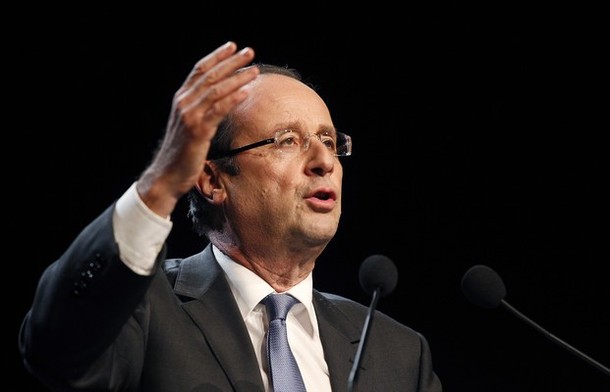“It is my responsibility as a leader of a founder member of the European Union…to pull Europe out of this torpor that has gripped it, and to reduce people’s disenchantment with it. If Europe stays in the state it is in now, it could be the end of the project.” Europe owes French President Francois Hollande a deep debt of gratitude.
His call for an “economic government” for the Eurozone with its own budget, the right to borrow, a harmonized tax system, and a full-time president was the first really honest statement of intent by one Europe’s big leaders. The federal cat is now out of the Euro bag.
Hollande has also revealed for what it is the nonsense being peddled by those in Britain who argue that Britain’s relationship with much of the rest of Europe is about this EU or simply a matter of economics. It is about Britain’s relationship with Hollande’s Europe, a future federalized EU vitally-needed to preserve the Euro. As we approach Le Crunch is there any way a just balance can be found between Hollande’s and Cameron’s very different visions for Europe?
Hollande faces three major roadblocks before he realizes his “Europe.” Berlin buys into much of what Hollande suggests, at least in theory. However, Chancellor Angela Merkel still believes she can prevent the British and French extremes from pulling the EU apart. She is also fully aware that behind Hollande’s call is not simply a vision of Europe long a dream of those on the Mitterand Left of French politics. It also reflects a Paris desperate to get the German, Dutch, and other northern Europeans to bear the burden for French public debt. The German people will not accept debt mutualization without fiscal and budgetary discipline and that means massive structural economic and political reforms. That in effect is precisely what Hollande is offering Berlin.
If Berlin accepts the offer then Eurozone governments will need first to overcome deep public dissatisfaction with both the EU and the political elite. Recent Eurobarometer data demonstrates the gravity of the crisis. Since 2008 trust in the EU has crashed from 20 to -29 polling points in Germany, 30 to -22 points in Italy, from 42 to -52 points in Spain, and from 50 to 6 points in Poland. Critically, the polls have moved from 10 to -22 points in France, which is clearly of deep concern to Hollande. Not surprisingly support in Britain has shifted from a heady -13 to a relationship-busting -49. It is unclear whether this data reflects dissatisfaction with the way the crisis has been handled or something deeper; that the European nation-state actually still matters to its citizens.
For Cameron Hollande’s timing could not have been worse, which may of course explain it. The Hollande speech came a day after Cameron suffered the worst parliamentary revolt over Europe of any sitting prime minister. Cameron is now in full EU crisis mode. Hollande has also made it much harder for Cameron to negotiate a “new relationship” for Britain with the EU. Indeed, implicit in Hollande’s offer to Berlin is another mug’s deal for London: even less influence for the same if not more massive cost. This makes a mockery of London’s mantra that Britain’s relationship is not about to change fundamentally. Even if London does precisely nothing Britain’s relationship with the EU will change fundamentally and not for the better.
So can a “new relationship” be forged? Cameron believes he has allies in both Berlin and The Hague. However, they are inside the Euro and Britain is not. With the best will in the world it is hard to see what deal could be struck amenable to a power centralizing Eurozone and to a power repatriation-seeking Britain – one camp which wants a super-Brussels and one state that seeks a mini-Brussels. Unless that is those EU member-states outside the Eurozone are firmly embedded in an EU-US Trade and Investment Partnership Agreement. Such an agreement would be a real game-changer and which explains Cameron’s visit last week to Washington. In effect a huge single market would balance a large currency union. However, Cameron should not hold his breath. One of my well-placed Washington sources tells me that the Obama administration is only playing with this idea, it has little support in Congress and that part of the reason for floating this is to help Cameron see off his rebellious back-benchers.
Cameron, Hollande, and Merkel should at least be given the chance to strike this new balance but they had better get on with it. If not Hollande is right – the EU and the Eurozone will become one and the same thing and those in the twilight zone between the Eurozone and an exit will find themselves in a strategic, political, and economic no man’s land, which apparently is where the Obama administration now wants to cast Britain. So much for the Special Relationship! Why can Americans never ‘get’ Europe?
In other words the Eurozone either integrates or disintegrates. If the latter then the Euro fails and it is hasta la vista EU!
Je dois vous remercie, Monsieur le President!
Julian Lindley-French is a member of the Atlantic Council’s Strategic Advisory Group. This essay first appeared on his personal blog, Lindley-French’s Blog Blast.
Image: getty%202%2024%2012%20Francois%20Hollande.jpg
